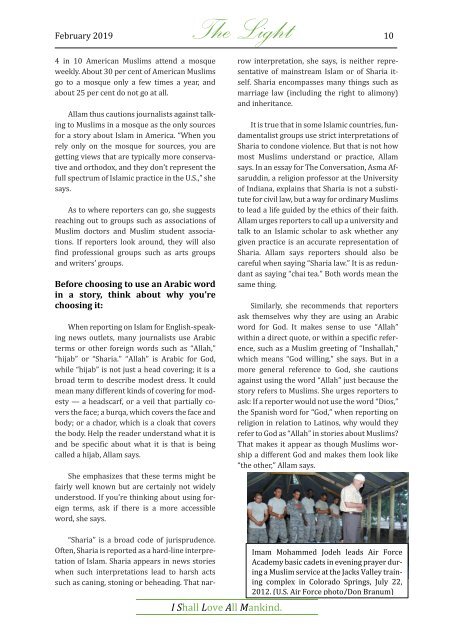The LIght February 2019 02
English monthly magazine published Anjuman Ishaat Islam Lahore. Presenting as taught by the Holy Prophet (s) - a peaceful, tolerant, inclusive and rational religion which teaches its adherents to respect the followers and founders of all faiths.
English monthly magazine published Anjuman Ishaat Islam Lahore. Presenting as taught by the Holy Prophet (s) - a peaceful, tolerant, inclusive and rational religion which teaches its adherents to respect the followers and founders of all faiths.
Create successful ePaper yourself
Turn your PDF publications into a flip-book with our unique Google optimized e-Paper software.
<strong>February</strong> <strong>2019</strong> <strong>The</strong><br />
Light 10<br />
4 in 10 American Muslims attend a mosque<br />
weekly. About 30 per cent of American Muslims<br />
go to a mosque only a few times a year, and<br />
about 25 per cent do not go at all.<br />
Allam thus cautions journalists against talking<br />
to Muslims in a mosque as the only sources<br />
for a story about Islam in America. “When you<br />
rely only on the mosque for sources, you are<br />
getting views that are typically more conservative<br />
and orthodox, and they don’t represent the<br />
full spectrum of Islamic practice in the U.S.,” she<br />
says.<br />
As to where reporters can go, she suggests<br />
reaching out to groups such as associations of<br />
Muslim doctors and Muslim student associations.<br />
If reporters look around, they will also<br />
find professional groups such as arts groups<br />
and writers’ groups.<br />
Before choosing to use an Arabic word<br />
in a story, think about why you’re<br />
choosing it:<br />
When reporting on Islam for English-speaking<br />
news outlets, many journalists use Arabic<br />
terms or other foreign words such as “Allah,”<br />
“hijab” or “Sharia.” “Allah” is Arabic for God,<br />
while “hijab” is not just a head covering; it is a<br />
broad term to describe modest dress. It could<br />
mean many different kinds of covering for modesty<br />
— a headscarf, or a veil that partially covers<br />
the face; a burqa, which covers the face and<br />
body; or a chador, which is a cloak that covers<br />
the body. Help the reader understand what it is<br />
and be specific about what it is that is being<br />
called a hijab, Allam says.<br />
She emphasizes that these terms might be<br />
fairly well known but are certainly not widely<br />
understood. If you’re thinking about using foreign<br />
terms, ask if there is a more accessible<br />
word, she says.<br />
“Sharia” is a broad code of jurisprudence.<br />
Often, Sharia is reported as a hard-line interpretation<br />
of Islam. Sharia appears in news stories<br />
when such interpretations lead to harsh acts<br />
such as caning, stoning or beheading. That narrow<br />
interpretation, she says, is neither representative<br />
of mainstream Islam or of Sharia itself.<br />
Sharia encompasses many things such as<br />
marriage law (including the right to alimony)<br />
and inheritance.<br />
It is true that in some Islamic countries, fundamentalist<br />
groups use strict interpretations of<br />
Sharia to condone violence. But that is not how<br />
most Muslims understand or practice, Allam<br />
says. In an essay for <strong>The</strong> Conversation, Asma Afsaruddin,<br />
a religion professor at the University<br />
of Indiana, explains that Sharia is not a substitute<br />
for civil law, but a way for ordinary Muslims<br />
to lead a life guided by the ethics of their faith.<br />
Allam urges reporters to call up a university and<br />
talk to an Islamic scholar to ask whether any<br />
given practice is an accurate representation of<br />
Sharia. Allam says reporters should also be<br />
careful when saying “Sharia law.” It is as redundant<br />
as saying “chai tea.” Both words mean the<br />
same thing.<br />
Similarly, she recommends that reporters<br />
ask themselves why they are using an Arabic<br />
word for God. It makes sense to use “Allah”<br />
within a direct quote, or within a specific reference,<br />
such as a Muslim greeting of “Inshallah,”<br />
which means “God willing,” she says. But in a<br />
more general reference to God, she cautions<br />
against using the word “Allah” just because the<br />
story refers to Muslims. She urges reporters to<br />
ask: If a reporter would not use the word “Dios,”<br />
the Spanish word for “God,” when reporting on<br />
religion in relation to Latinos, why would they<br />
refer to God as “Allah” in stories about Muslims?<br />
That makes it appear as though Muslims worship<br />
a different God and makes them look like<br />
“the other,” Allam says.<br />
I Shall Love All Mankind.<br />
Imam Mohammed Jodeh leads Air Force<br />
Academy basic cadets in evening prayer during<br />
a Muslim service at the Jacks Valley training<br />
complex in Colorado Springs, July 22,<br />
2012. (U.S. Air Force photo/Don Branum)














